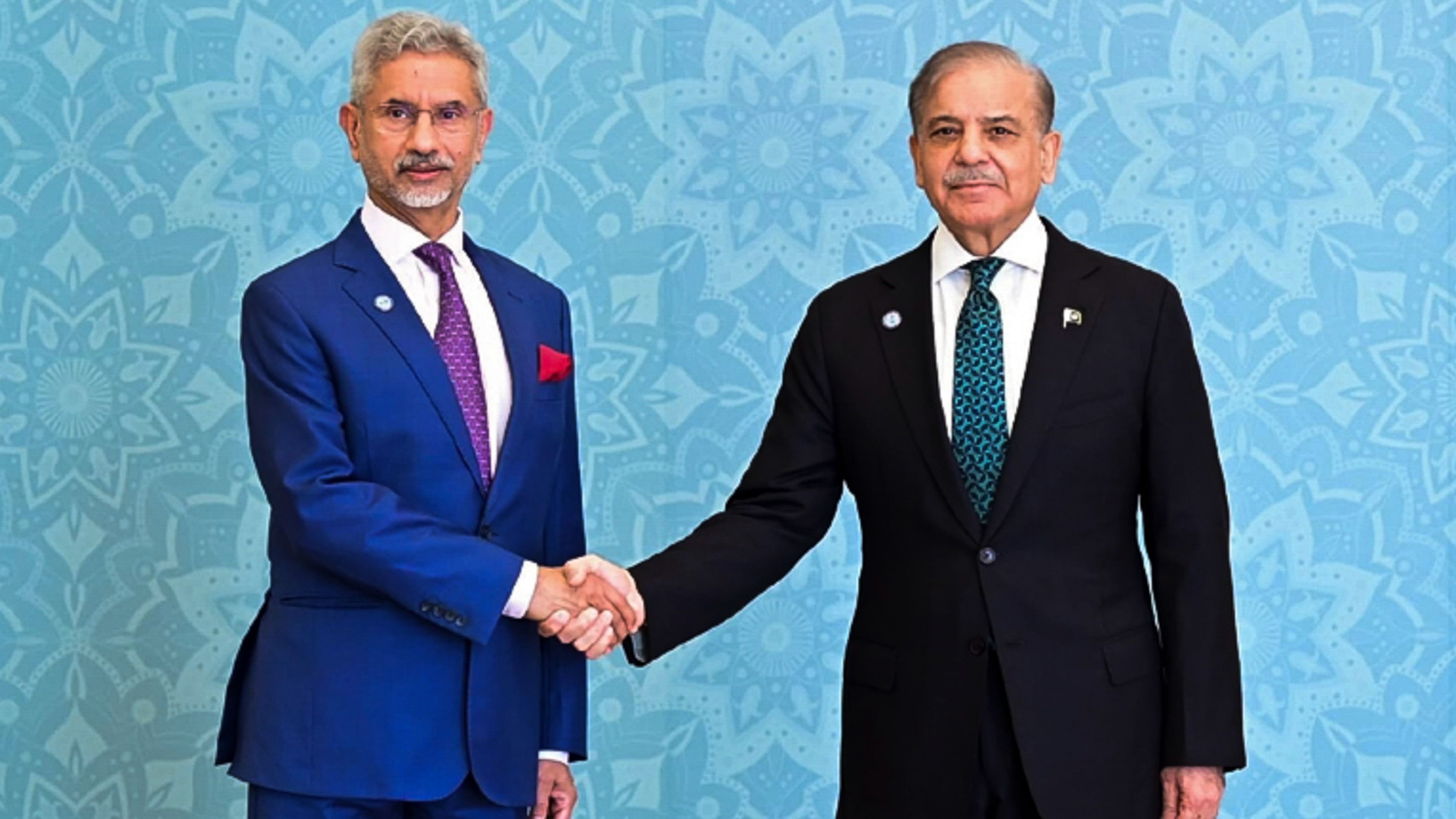
External Affairs Minister S Jaishankar shakes hands with Pakistan Prime Minister Shehbaz Sharif at the 23rd meeting of the SCO Council of Heads of Government, in Islamabad, Wednesday.
Credit: PTI Photo
The 23rd meeting of the SCO Council of Heads of Government hosted by Pakistan on October 15 and 16, in Islamabad, was noted for the first visit by an Indian External Affairs Minister to Pakistan in nearly a decade. The summit saw an informal meeting between S Jaishankar and Pakistan Prime Minister Shehbaz Sharif. Jaishankar had clarified that his trip was not intended for talks on India-Pakistan relations but focused on the multilateral event held in a neighbouring country. His remarks indicated the significance of India’s engagement with its South Asian neighbours and other Eurasian partners.
The summit stood out for the hopes it presented for a thaw in the India-Pakistan relations as the neighbours indicated a willingness to prioritise multilateral cooperation by setting aside bilateral issues. While Pakistan underlined the need for a “United Eurasia”, New Delhi indicated the importance of multilateral partnerships over unilateral agendas, which could foster a cooperative neighbourhood.
India has major issues with the SCO concerning its neighbours as organisation partners. Its relations with Pakistan have remained deeply strained since the Pulwama attack in February 2019. The SCO’s ineffectiveness in addressing core security issues in the region underscores India’s concerns regarding the organisation. India is also the only SCO member not involved in China’s Belt and Road Initiative (BRI) due to its opposition to the China-Pakistan Economic Corridor (CPEC).
Jaishankar mentioned the eradication of terrorism and anti-sovereignty stances taken by countries but the relatively mild diplomatic language presented an opportunity to ease the rhetoric despite conflicted relations. The EAM’s visit may serve multiple strategic purposes beyond the stated official objectives. Firstly, it offered a platform for informal dialogue with Pakistan and secondly, it aimed to counter speculation regarding India’s commitment to the SCO, fuelled by its irregular attendance at past summits.
Prime Minister Narendra Modi’s absence from the July 2024 Heads of State Summit in Astana further amplified such speculation. Prior to this, in 2021, the Prime Minister attended the Dushanbe meeting virtually and in 2023, India hosted the SCO Summit virtually after initially postponing it, raising questions about its dedication to the grouping. Jaishankar’s visit, therefore, serves to reaffirm India’s interest in the SCO as a key avenue for regional diplomacy.
The visit is also significant because India is a key actor in Russia’s ‘Greater Eurasia partnership’, and the SCO is the only regional organisation which brings all major Eurasian players together. India’s ambitions of gaining a foothold in Eurasia differ from the ambitions of China and Russia. For New Delhi, alongside regional security, engaging with the markets of Central Asia and Caucasus is one of the top priorities, for which engagement with the SCO is critical, as it facilitates India’s strategic access to Central Asia. India also aims to prevent a diplomatic impasse within the SCO, avoiding a SAARC-like deadlock due to India-Pakistan tensions. The SCO, which includes key partners like Russia and Central Asian countries, is essential for India’s multilateral goals beyond managing ties with Pakistan and China.
Since joining in 2017 with one of the primary objectives of countering cross-border terrorism, India’s focus has shifted to boosting regional trade and connectivity with Central Asia.
Shared objectives in region
Jaishankar’s emphasis on multilateral engagement reflects India’s commitment to regional cooperation projects like the TAPI gas pipeline which involves India and Pakistan, along with Turkmenistan and Afghanistan and is crucial for India’s energy security. Similarly, the Pakistan PM’s statement on enhancing Eurasian ties underscores a mutual interest in regional development despite bilateral differences.
While this visit may not result in any immediate breakthrough in India-Pakistan relations, it indeed served as an important ice-breaking opportunity. Engaging in informal discussions on the margins of multilateral forums may pave the way for future dialogue between the two countries.
Jaishankar’s visit is a nuanced foreign policy operation, which, although symbolic, manifests that India’s ambitions of engaging with Eurasia outweigh the political irrelevance of Pakistan for India today. Both nations recognise that regional development requires cooperation, and in the absence of formal peace talks, informal interactions offer a platform for communication.
Cross-border terrorism hinders India-Pakistan dialogue; yet, regional security is a key priority for all SCO countries amid rising Afghan-led threats. Both India and Pakistan are committed to addressing this issue through multilateral cooperation. Although significant bilateral progress is unlikely any time soon without a fundamental shift in positions, this visit represents the first step in breaking the diplomatic deadlock and fostering greater regional engagement through multilateral diplomacy.
(The writer is a PhD scholar at Jawaharlal Nehru University)